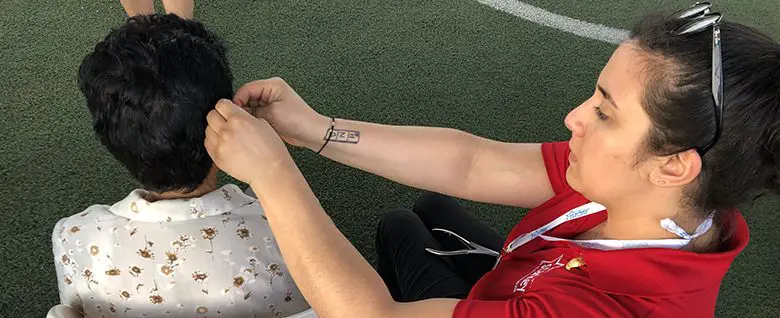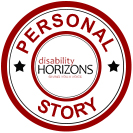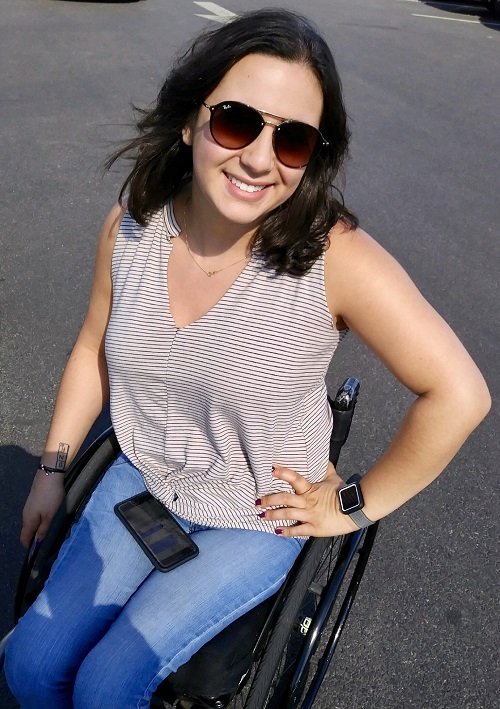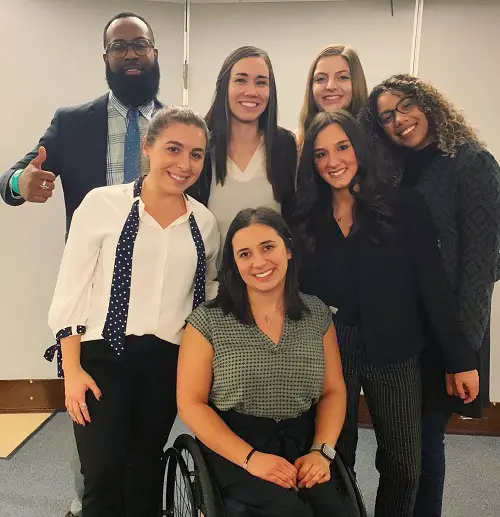
Future audiologist has a unique perspective as a wheelchair user
Olivia Bender was diagnosed with Transverse Myelitis at the age of 14 and since then has used a wheelchair for mobility. She’s currently training to be an audiologist and, as this article goes out, is on a mission trip with her classmates in Peru giving free hearing aids to people who need them. Read on to hear about how her experiences with a physical disability will provide insight into her future career in Audiology.
 Transverse Myelitis is a rare neurological autoimmune disease. The body attacks its own spinal cord, causing inflammation, which then damages the nerves in the spine. This nerve damage most often leads to paralysis of varying levels.
Transverse Myelitis is a rare neurological autoimmune disease. The body attacks its own spinal cord, causing inflammation, which then damages the nerves in the spine. This nerve damage most often leads to paralysis of varying levels.
I was affected at my T10 vertebrae and am now a paraplegic from the waist down. I am a wheelchair user and will most likely be for the rest of my life. However, I do not let my disability keep me from enjoying life, receiving an education, and exploring the world.
Training to be an audiologist
I am currently pursuing a Doctorate degree in Audiology at the Long Island Audiology Consortium, which is one of the largest audiology programs in the United States. After spending seven weeks in a rehabilitation hospital after my diagnosis, I knew I wanted to work in healthcare. I was so appreciative of all of the people tending to my needs and helping me regain my independence, that I wanted to give back to others.
I was originally studying speech therapy in college, but quickly switched to audiology when I took my first class. Speech therapy has more grey areas, and audiology is more of a black and white field. I enjoy the combination of biology and technology, and I love working with patients. My favourite part of the field is building a special relationship with each person I treat.
I constantly get asked; “what is audiology?” Audiology is the study of hearing and balance. Audiologists are certified to work with hearing aids, cochlear implants, assistive listening devices, perform hearing and balance tests, as well as a myriad of other tests and devices. It’s a relatively large field, and we are able to work in multiple different types of environments, which makes the job always exciting and never boring.

Being an empathetic audiologist
Because I have spent so much time in hospitals, it feels like the most comfortable environment for me. I hope to one day work in a hospital setting and work with children who receive cochlear implants.
As a third-year Audiology student, I am currently interning at a private practice affiliated with a school for the Deaf. I’m honing my skills in audiological testing, and even more so with hearing aids. Within the past decade, the technology in hearing aids has changed drastically. They are basically tiny computers in your ears that give people with hearing loss the chance to potentially hear at a normal level.
I am honestly impressed and surprised by these devices every day, and seeing the success that my patients have with them really proves to me that hearing aids are truly making a difference in people’s lives.
Although having a physical disability is extremely different than having hearing loss, I feel as though I can strongly relate to many of my patients. Hearing loss is something that can make people feel isolated and different. People who wear hearing aids might feel as though they are being judged by others, especially when they are wearing a device that can potentially be seen by society.
Being in a wheelchair, I absolutely know how that feels. I understand what stigma feels like, I know how frustrating everyday tasks can be, and I realize how hard it is to overcome obstacles. There are times I feel self-conscious in my wheelchair around others. There are times I feel as though I don’t fit in with society.
Many audiologists, or health care professionals in general, don’t necessarily relate to their patients on that level. My disability definitely gives me a sense of empathy that others may struggle to find. I think it gives me a “leg up” when working with patients. My struggles in life have given me the strength to build others up when they too are struggling.

Making our world more inclusive to all disabled people
The stigma that society has towards individuals with disabilities is very real and very relevant. Perhaps it is due to lack of awareness and education, or perhaps it is solely related to the ignorance of others.
Either way, this is something I wish I could change. Whether you have a physical disability and use crutches or a wheelchair, or you wear glasses or hearing aids, we should all be treated the same way: with respect and kindness.
We very rarely see people with disabilities in the spotlight or present in media, and this is something that needs to change. Society would benefit from an all-inclusive world, and maybe this would decrease this stigma that humanity has.
I hope that as an audiologist and a wheelchair user, I can one day advocate for all people with disabilities. I envision a world where humans are all considered “normal”, regardless of our abilities or our differences.
I look forward to my graduation date and starting my career in audiology, when I can prove to patients with hearing loss that a disability is only as disabling as you allow it to be. I look forward to helping my patients thrive and feel hopeful for the future.
By Olivia Bender
More on Disability Horizons…
- Let’s change how we talk about disability
- Why is disability still portrayed as a punishment
- The real effect of austerity on people with learning disabilities
We want to hear your story. Email editor@disabilityhorizons.com, message us on Facebook or tweet us @DHorizons.